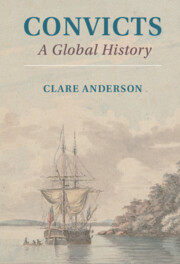'This book is a truly global history of convicts that foregrounds the subaltern subjects who made the modern world. From contributing to scientific knowledge clearing land, building infrastructure, and expanding the territorial ambitions of faraway empires, this book shows how unfree labourers became a prominent feature of a modern global regime after the abolition of slavery. Rigorously researched and intellectually capacious, the book is a must-read for global historians.'
Durba Ghosh - author of Gentlemanly Terrorists: Political Violence and the Colonial State in India, 1919–1947
'This astonishing book defines the term magnum opus. With this superb global history from below, based on over twenty-five years of research, Clare Anderson has changed our understanding of world history. From the fifteenth to the twentieth centuries, convict transportation and labour sustained empires and nations, economies and knowledge systems.'
Angela Woollacott - author of Settler Society in the Australian Colonies: Self-Government and Imperial Culture
‘This is an expansive yet fine-grained exploration of the national, regional and global history of punitive mobility. Weaving together a complex array of cases and conditions, Anderson engages the reader in an analysis of a system that not only affected the lives and fates of millions of people, but has shaped ways of thinking about and organising the world that endure into the present.’
Briony Neilson
Source: Australian Book Review
‘An impressively informative work of original and meticulously presented scholarship, Convicts: A Global History is a seminal work that is an exceptional and unreservedly recommended addition to community, college, and university library Criminology and Penology History collections.’
James A. Cox
Source: Midwest Book Review
‘Convicts: A Global History is a huge temporal and geographical undertaking … One of the many strengths of the book is its constant switch of perspective, focussing alternately on the imposition of power from above and its contestation from below.’
Hamish Maxwell-Stewart
Source: Journal of Colonialism and Colonial History
'The temporal, geographical, and analytical scope of Anderson’s analysis is extremely impressive, as is the list of archival collections she has consulted.'
Briony Neilson
Source: Australian Book Review
‘The wait for Clare Anderson’s field-defining book is finally over. Drawing on her own quarter century of research into the history of convict transportation … Convicts: A Global History leaves the reader in absolutely no doubt about the importance of punitive mobility to the making of the modern globalized world.’
Niklas Frykman
Source: International Journal of Maritime History
‘… a masterful account of “punitive mobility” … In this impressive book [Anderson] uses a vast literature and a swathe of archival resources to dissect five hundred years of penal labour exploitation, revealing its trans-colonial impacts and the legacies left by more than one million transported penal workers.’
Hamish Maxwell-Stewart
Source: Journal of Colonialism and Colonial History
'… big, important, well-researched …'
Linda Colley
Source: London Review of Books
‘… deeply researched, richly empirical … deserves to be very widely read, including by those concerned with broader processes of capitalism, imperialism, and unfree labour.’
Jane Lydon
Source: Australian Historical Studies
'Convicts: A Global History is a remarkable achievement, a work of global history based on many years of research that restores a subaltern group to its place in the world through both a panoramic overview and the tracing of individual lives lived in extremis.'
Miles Ogborn
Source: Journal of Interdisciplinary History
‘This very global history of convicts provides a wonderful complement to tales of other global travellers, such as Africans caught up in transatlantic slavery.’
Trevor Burnard
Source: Slavery & Abolition: A Journal of Slave and Post-Slave Studies



